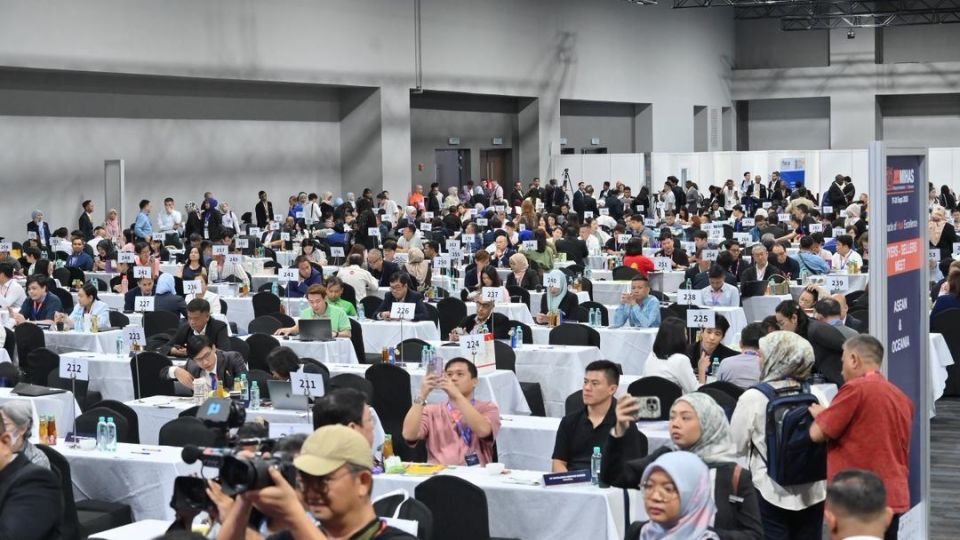September 19, 2025
SEOUL – The Malaysia International Halal Showcase, the world’s largest halal trade event, kicked off its 21st edition Wednesday with its most globally diverse showing yet.
On its opening day, MIHAS’s hallmark business-matching platform, the International Sourcing Program, facilitated over 4,000 one-on-one meetings between 600 Malaysian exporters and 450 international buyers, 300 in person and 150 online.
Asian companies, including South Korean firms, made up a major share of buyers eager to tap into the growing halal economy.
Korea stood out among non-Muslim-majority countries, with 13 small and medium-sized enterprises participating as buyers. While China and Bangladesh led in numbers with 39 companies each, Korean firms held court with a deeper pursuit of halal-certified imports, with participation rising from nine in 2024.
“We’re meeting with local snack manufacturers in Malaysia to explore expanding our product lineup,” said the CEO of Chips Seoul, who attended MIHAS intending to diversify the company’s business portfolio.
The company already exports to Taiwan, Singapore and Malaysia with halal certification in place. “Test sales in the region have shown promise, so we’re now considering local production to better support growing demand.”
Halal-certified products have increasingly become a symbol of trust in Korea, according to Kim No-jin, a senior buyer at local supplier Radix Globiz. “We came looking for healthier halal-certified products. It’s where the market is heading, and we want to pivot toward better-for-you foods starting next year.”
Adjusting Malaysian halal products to suit Korean tastes and regulations takes time, Kim admitted, citing ongoing back-and-forth with importers to find the right balance.
Others, like Lim Seob-I, CEO of Liyu Corporation, which specializes in coffee and tea, are using halal-certified ingredients as a foundation for brand-building. “These are trusted, verified goods,” he said. “One seller we met offered coconut powder, and we’re now considering creating a new beverage brand around it for export.”
Also present at the venue was Dato’ Seri Reezal Merican Naina Merican, chair of the Malaysia External Trade Development Corporation, who noted that halal is no longer limited to food.
“Halal today is highly demanded even by non-Muslim consumers, not just for food, but for everything from ingredients and packaging to logistics,” he said. “It represents hygiene, security and sustainability.”
Malaysia is widely recognized as a global pioneer in halal certification, having centralized its system under federal oversight starting in 2011.
On the other side of the exhibition center, Korean firms were active on the halal-ready product front, with eight exhibitors under the Korea Rice Foodstuffs Association and 15 more represented by the Korea Trade-Investment Promotion Agency.
According to Moon Jin-wook, director general of KOTRA Kuala Lumpur, many of the Korean exhibitors are already halal-certified. “Without halal, the market is limited,” he said.
Hayanhaessal, part of the rice association, is a six-year exporter specializing in halal-certified tteokbokki. “We’ve already entered CU convenience stores in Malaysia and now aim for large retail chains across Malaysia and Indonesia.”
With demand for halal beauty on the rise, Korean beauty service firms are finding inroads.
“We offer full solutions in personal color consultation from franchise-ready tools to training academies,” said an official from Image Plus, a Seoul-based beauty consulting firm. “Malaysia is just the beginning. There’s strong interest in K-beauty, and we’re here to find partners who understand the value of beauty as a service, not just a product.”
Themed “Pinnacle of Halal Excellence,” MIHAS 2025 runs through Saturday at the Malaysia International Trade and Exhibition Center, drawing 45,000 visitors, 2,400 booths and participants from 80 countries.
Last year, it set a new benchmark with total sales reaching 4.3 billion Malaysian ringgit ($1 billion). This year, the sourcing program alone is targeting 2.5 billion ringgit in sales.
“We hope MIHAS is not just a tool that by measure alone. It is indeed a window for all of us to come together and to promote the halal industry to the global height,” said Matrade Chair Reezal Merican.


